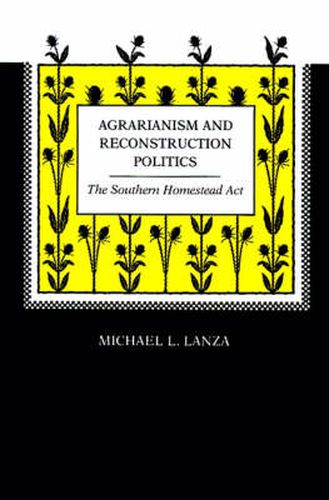Readings Newsletter
Become a Readings Member to make your shopping experience even easier.
Sign in or sign up for free!
You’re not far away from qualifying for FREE standard shipping within Australia
You’ve qualified for FREE standard shipping within Australia
The cart is loading…






This title is printed to order. This book may have been self-published. If so, we cannot guarantee the quality of the content. In the main most books will have gone through the editing process however some may not. We therefore suggest that you be aware of this before ordering this book. If in doubt check either the author or publisher’s details as we are unable to accept any returns unless they are faulty. Please contact us if you have any questions.
At the close of the Civil War, the Federal government undertook a sweeping reform of land tenure in the South with the passage of the Southern Homestead Act of 1866. Designed primarily to allow freedmen to settle public land and take part in the great agrarian program of establishing a nation of independent yeoman farmers, the act soon became the victim of political abuses, bureaucratic ineptitude, and burgeoning racism. In Agrarianism and Reconstruction Politics, Michael L. Lanza studies the conception, evolution, and demise of this critical aspect of Reconstruction history. Lanza deals with the formulation of the act in Congress, the implementation of new land regulations in the southern states, and the distribution of land to the hopeful body of southern freedmen. As Lanza points out, however, the homesteaders faced obstacles and disappointments at almost every turn. White southerners vehemently opposed black landownership and did everything possible to stand in the freemen’s way. Furthermore, much of the land allocated to the homesteaders proved unfarmable. An unwieldy, sometimes dishonest bureaucracy and a lessening of support from the Republican party were additional barriers that prevented the Southern Homestead Act from living up to its promise. Lanza relies on letters written by many homesteaders to paint a vivid picture of their hopes, frustrations, achievements, and failures.Historians have long debated the centrality of land distribution policies to Reconstruction history. But until now one has fully considered the single most important measure adopted during Reconstruction to provide land to the landless. Drawing on records of the General Land Office, contemporaneous newspaper accounts, and other sources, Michael Lanza’s study of the Southern Homestead Act provides a significant new interpretation of land policy during this era.
$9.00 standard shipping within Australia
FREE standard shipping within Australia for orders over $100.00
Express & International shipping calculated at checkout
This title is printed to order. This book may have been self-published. If so, we cannot guarantee the quality of the content. In the main most books will have gone through the editing process however some may not. We therefore suggest that you be aware of this before ordering this book. If in doubt check either the author or publisher’s details as we are unable to accept any returns unless they are faulty. Please contact us if you have any questions.
At the close of the Civil War, the Federal government undertook a sweeping reform of land tenure in the South with the passage of the Southern Homestead Act of 1866. Designed primarily to allow freedmen to settle public land and take part in the great agrarian program of establishing a nation of independent yeoman farmers, the act soon became the victim of political abuses, bureaucratic ineptitude, and burgeoning racism. In Agrarianism and Reconstruction Politics, Michael L. Lanza studies the conception, evolution, and demise of this critical aspect of Reconstruction history. Lanza deals with the formulation of the act in Congress, the implementation of new land regulations in the southern states, and the distribution of land to the hopeful body of southern freedmen. As Lanza points out, however, the homesteaders faced obstacles and disappointments at almost every turn. White southerners vehemently opposed black landownership and did everything possible to stand in the freemen’s way. Furthermore, much of the land allocated to the homesteaders proved unfarmable. An unwieldy, sometimes dishonest bureaucracy and a lessening of support from the Republican party were additional barriers that prevented the Southern Homestead Act from living up to its promise. Lanza relies on letters written by many homesteaders to paint a vivid picture of their hopes, frustrations, achievements, and failures.Historians have long debated the centrality of land distribution policies to Reconstruction history. But until now one has fully considered the single most important measure adopted during Reconstruction to provide land to the landless. Drawing on records of the General Land Office, contemporaneous newspaper accounts, and other sources, Michael Lanza’s study of the Southern Homestead Act provides a significant new interpretation of land policy during this era.